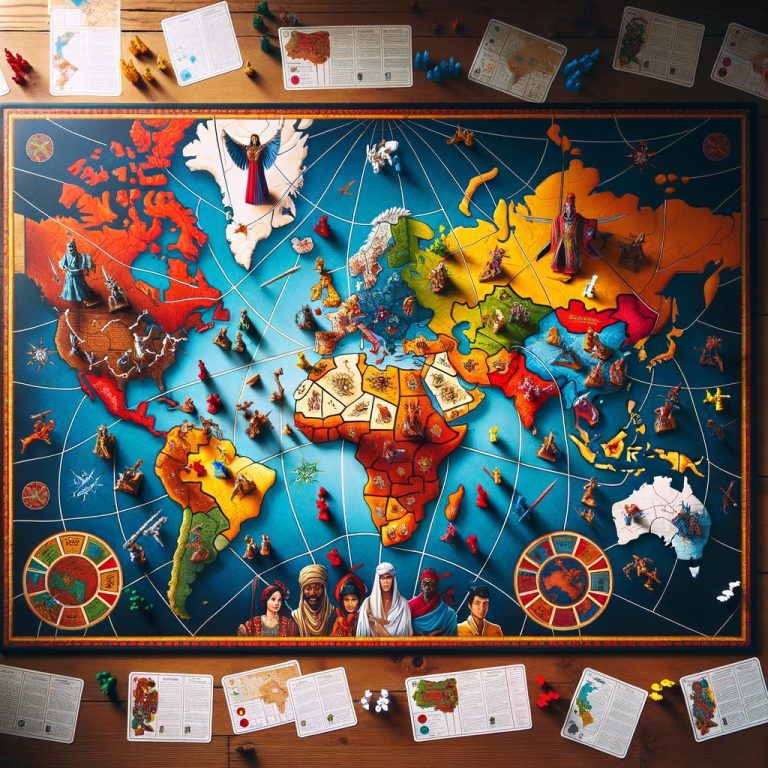Risk is more than just a game; it’s a strategic battlefield where countries test their skills and tactics to emerge victorious. In this article, we delve into the world of Risk: the strategy board game that has captivated players around the globe. From its origins to its impact on international relations, we explore how countries approach this intense game of conquest and diplomacy.
As one of the most popular strategy board games, Risk has a rich history that dates back to its creation in the late 1950s. Over the years, it has evolved into a complex and challenging game that demands careful planning, cunning tactics, and diplomatic negotiations. Understanding the rules of Risk is crucial for players seeking success on the virtual battlefield where every move can determine victory or defeat.
Strategic planning is at the heart of playing Risk effectively. Players must navigate alliances, build armies, and conquer territories while keeping a keen eye on their opponents’ moves. In this section, we will explore key tactics and tips for mastering the art of Risk and achieving gameplay goals. Join us as we uncover the secrets to outwitting rivals and dominating the global stage in Risk: The Strategy Board Game.
History of Risk
It wasn’t until 1959 when Parker Brothers acquired the rights to the game and rebranded it as Risk: The Game of Global Domination. Since then, Risk has undergone several modifications and editions to cater to a wider audience and keep up with changing times.
The Evolution of Risk
Over the years, Risk has evolved from a simple roll-and-move game into a complex strategic experience that requires skillful planning and diplomacy. From its early days of using cardboard cutouts as playing pieces to modern versions that include intricately designed miniatures and specialized game boards, Risk has continually adapted to meet the demands of its players.
The introduction of themed editions such as Lord of the Rings Risk and Star Wars Risk has further expanded the game’s appeal and fan base.
Popularity and Influence
The widespread popularity of Risk can be attributed to its engaging gameplay mechanics, which combine elements of strategy, negotiation, and luck. Players must carefully consider troop deployment, territory control, and alliances in order to conquer their opponents and achieve global dominance.
This blend of tactics makes Risk a favorite among casual gamers and serious strategists alike. Furthermore, the game’s influence extends beyond leisurely pursuits; it has been used in academic settings to teach concepts such as geopolitics, conflict resolution, and decision-making.
Understanding the Rules of Risk
Risk is a classic strategy board game that involves players vying for world domination by conquering territories and eliminating opponents through calculated moves and alliances. Understanding the rules of Risk is crucial in order to effectively navigate the complexities of gameplay and achieve victory. The primary objective of the game is to eliminate all other players by capturing their territories, while also strategically expanding your own empire across the map.
One key aspect of Risk gameplay is the distribution of armies at the beginning of the game, which sets the stage for future conquests. Players must strategically place their initial armies across territories they control, with a focus on securing continents for additional reinforcements. This initial phase sets the tone for how countries play Risk the strategy board game, as it establishes early alliances, potential conflicts, and overall strategic planning.
As the game progresses, players take turns reinforcing their armies, attacking opponent territories, and fortifying their own defenses. Understanding when to attack, how many armies to commit, and when to consolidate forces are critical decisions that can make or break a player’s chances of success in Risk.
The interplay between luck and skill adds an element of uncertainty to the game, challenging players to adapt their strategies based on evolving circumstances. Ultimately, mastering the rules of Risk requires a balance of risk-taking, diplomacy, and tactical prowess in order to emerge victorious on the global stage.
Strategic Planning in Risk
In the game of Risk, strategic planning is crucial to achieving victory. Players must carefully consider their every move and anticipate the actions of their opponents to come out on top. From fortifying territories to launching attacks, mastering key tactics and tips can significantly enhance one’s chances of success in this intense strategy board game.
Understanding Territory Control
One essential aspect of strategic planning in Risk is maintaining control over territories. By focusing on specific regions and building up reinforcements there, players can establish a strong presence on the board. Knowing when to expand into new areas and when to consolidate existing holdings is key to creating a formidable empire that can withstand attacks from other players. Balancing offense with defense is crucial in achieving dominance over the map.
Utilizing Card Sets Effectively
Risk involves collecting sets of cards that can be traded in for reinforcements. Strategic planning comes into play when deciding the optimal time to cash in these card sets. Holding onto them for too long may leave a player vulnerable to attack, while trading them in too early could result in missed opportunities for expansion. Understanding the value of card sets and using them strategically can give players a significant advantage in the game.
Adapting to Changing Circumstances
Flexibility is another key component of successful strategic planning in Risk. As the game progresses and situations evolve, players must be prepared to adjust their tactics accordingly. This may involve forming alliances with other players, changing strategies mid-game, or taking calculated risks to gain an edge over opponents. Being able to adapt to changing circumstances is essential for navigating the complexities of Risk and emerging victorious against competitors.
How Countries Approach Risk
Countries around the world approach Risk, the strategy board game, in various ways that are often influenced by their unique cultural backgrounds. The way nations play Risk can provide insights into their strategic thinking and decision-making processes. For example, countries known for their emphasis on long-term planning and foresight may adopt a cautious and methodical approach to the game, focusing on defense rather than aggression.
In contrast, countries with a more aggressive or risk-taking cultural mentality may be more inclined to launch bold attacks and expand rapidly across the board in Risk. These players often prioritize seizing territories and controlling key regions early in the game to gain a competitive advantage over their opponents. Observing how different countries navigate Risk can offer valuable lessons on adaptability, resilience, and flexibility in strategic situations.
Furthermore, cultural influences can also shape communication styles during gameplay. In some cultures, direct and assertive communication is favored, leading to clear declarations of intent and negotiation terms in Risk. On the other hand, indirect or subtle communication strategies may be employed by players from cultures that value implicit messages and reading between the lines. Understanding these cultural nuances can be crucial in forming alliances, making deals, and ultimately emerging victorious in this dynamic strategy game.
| Cultural Influences | Gameplay Approach |
|---|---|
| Strategic Thinking | Varying approaches based on long-term planning or short-term gains |
| Communication Styles | Direct versus indirect methods influencing negotiation tactics |
| Risk-Taking Behavior | Differences in willingness to take chances or play it safe based on cultural norms |
Famous Risk Players
Risk, the strategy board game, has gained immense popularity across the globe, attracting players from all walks of life. The game requires strategic thinking, diplomacy, and a keen understanding of risk assessment. As a result, there are certain players who have risen to fame for their exceptional skills and tactics in playing Risk.
One famous Risk player is John Nash, whose mathematical prowess and strategic thinking made him almost unbeatable in the game. Nash believed in using game theory to predict his opponents’ moves and plan his strategies accordingly. His ability to analyze risks and make informed decisions earned him a reputation as one of the best Risk players in history.
Another legendary Risk player is Elizabeth Magie Phillips, who is credited with inventing another popular board game, Monopoly. Phillips was known for her innovative gameplay style in Risk, often employing unconventional tactics to outwit her opponents. Her creative approach to strategic planning sets her apart as a unique and influential figure in the world of Risk playing.
| Famous Player | Strategy |
|---|---|
| John Nash | Game Theory Analysis |
| Elizabeth Magie Phillips | Creative and Unconventional Tactics |
These legendary players serve as inspiration for aspiring Risk enthusiasts looking to enhance their gameplay skills. By studying their strategies and approaches to the game, players can gain valuable insights into how countries play Risk the strategy board game at a competitive level. Ultimately, learning from these iconic figures can help players develop their own unique gameplay style and improve their chances of success in this challenging and thrilling game.
Global Tournaments and Competitions
For enthusiasts of the classic strategy board game Risk, participating in global tournaments and competitions offers a unique opportunity to showcase their skills and compete against players from around the world. These events bring together individuals who share a passion for strategic gameplay and provide a platform to test their abilities against top contenders.
Whether you are a seasoned player looking to challenge yourself or a newcomer seeking to improve your tactics, joining a Risk tournament can be an exciting and rewarding experience.
Here are some renowned global tournaments where players can watch and participate in competitive Risk gameplay:
1. World Boardgaming Championships (WBC): The WBC is one of the largest gatherings of board gamers in the world, featuring a variety of competitive events including Risk tournaments. Held annually in Pennsylvania, USA, this event attracts players of all skill levels and provides an engaging environment for networking and friendly competition.
2. European Diplomacy Championships: This prestigious tournament showcases some of the best Risk players from Europe competing for the title of champion. Participants can expect intense matches, strategic gameplay, and opportunities to learn from experienced players. The event is held in different European countries each year, making it accessible to players across the continent.
3. Online Platforms: In addition to physical tournaments, there are also online platforms where Risk enthusiasts can participate in virtual competitions against opponents from different countries. Websites such as Warzone and Conquer Club host regular tournaments with varying formats and rules, allowing players to hone their skills and compete from the comfort of their own homes.
By engaging in global tournaments and competitions, players not only have the chance to demonstrate their strategic prowess but also interact with fellow enthusiasts who share their love for the game. Whether playing on a physical board or through online platforms, these events offer a thrilling experience that unites individuals from diverse backgrounds through a common interest in Risk. So gear up, strategize your moves, and get ready to conquer new territories on the battlefield.
The Future of Risk
As the game of Risk continues to evolve and adapt to the changing landscape of board games, there are several trends and innovations that have emerged in the world of strategy board games. From new adaptations of the classic game to technological advances in gameplay, the future of Risk looks promising for both casual players and serious competitors alike.
One trend in the world of strategy board games is the rise of digital versions of classic games like Risk. With the increasing popularity of online gaming platforms, many players now have the opportunity to enjoy their favorite strategy games with friends from around the world. Digital versions of Risk also offer new features and gameplay options that may not be available in traditional board game format, enhancing the overall gaming experience.
Another innovation in strategy board games is the integration of augmented reality (AR) and virtual reality (VR) technology. These cutting-edge technologies allow players to immerse themselves in a virtual world where they can interact with game elements in a whole new way. Imagine being able to see armies moving across a map or witnessing battles come to life right before your eyes – these advancements are revolutionizing how countries play Risk the strategy board game.
In addition to technological advancements, there is also a growing trend towards more thematic expansions and variations within strategy board games like Risk. Players can now explore different time periods, fictional worlds, or even alternate histories through themed versions of their favorite games. This allows for greater creativity and variety in gameplay, keeping players engaged and excited about what’s next in the ever-evolving world of strategy board games.
Conclusion
In conclusion, the game of Risk serves as a fascinating mirror to observe how countries play out strategies in a board game setting that mirrors real-world international relations and diplomacy. Through the history and evolution of Risk, we can see how cultural influences shape gameplay and decision-making processes.
Understanding the rules and key tactics of Risk not only improves one’s chances of winning but also provides valuable insights into strategic planning and critical thinking, skills that are essential in both gaming and real-life scenarios.
Furthermore, famous Risk players who have made a mark in the game offer valuable lessons on different playing styles, strategies, and approaches to risk-taking. Their profiles inspire aspiring players to think outside the box and adapt new techniques to enhance their gameplay. Additionally, global tournaments provide a platform for players from all corners of the world to showcase their skills, participate in friendly competition, and hone their strategic abilities.
As we look towards the future of strategy board games like Risk, we can expect to see continuous innovations that challenge players to think creatively and strategically. These trends will likely influence not only the gaming community but may also have an impact on international relations by fostering collaboration, understanding different perspectives, and resolving conflicts through strategic thinking.
Ultimately, how countries play Risk offers valuable insights into decision-making processes at a global level and underscores the importance of strategy in shaping diplomatic relationships on a grand scale.
Frequently Asked Questions
How Many Countries Does Risk Have?
Risk, the board game, has versions that cover various numbers of countries depending on the edition. The original version of Risk includes a map with 42 territories to conquer, while other editions may have different numbers.
What Is the Strategy Board Game Where You Take Over Countries?
The strategy board game where you take over countries is called Risk. In this game, players compete to control territories and continents by deploying armies, attacking opponents, and fortifying their positions strategically.
How Do You Play Risk the World Strategy Game?
To play Risk, each player takes turns deploying armies to conquer territories on the map based on dice rolls. Players can attack opponent’s territories and defend their own in order to expand their empire across the world map. The ultimate goal is to eliminate all other players and dominate the entire globe through calculated moves and strategic gameplay.

I love playing all kinds of games – from classics like Monopoly to modern favourites like Ticket to Ride.
I created this blog as a way to share my love of board games with others, and provide information on the latest releases and news in the industry.





